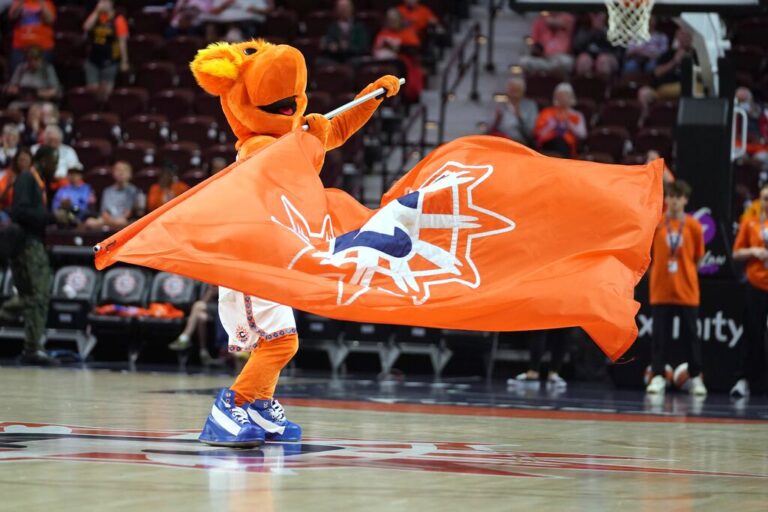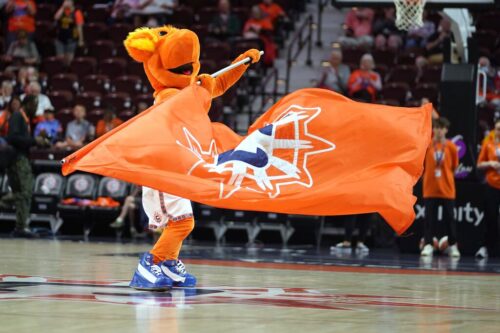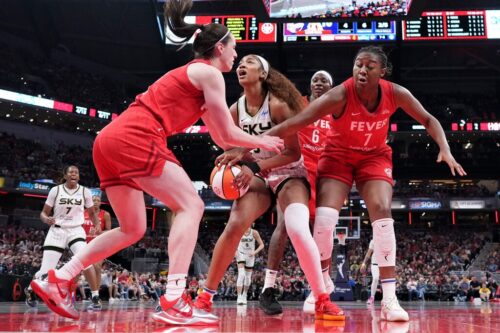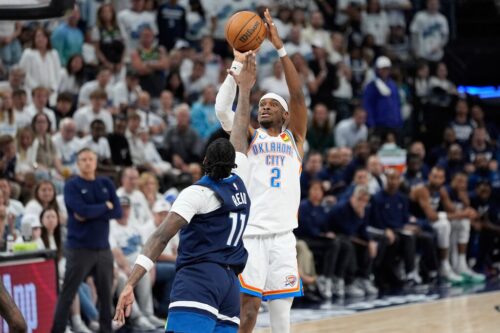The Connecticut Sun are one of the most successful franchises in the WNBA. They’ve won at a higher clip than any team since moving to Uncasville, Conn., in 2003. They’ve made the playoffs 16 times in 22 seasons and have played in three WNBA Finals — but have never won the title.
They seem primed to take advantage of the massive surge in the popularity of the WNBA, right? Maybe, but it might happen in a way that sees the franchise leave Connecticut.
Earlier this month, news broke that the Sun’s owners had hired investment bank Allen & Co. to look into “all options to strategically invest in the team.”
Simply put: They’re exploring if they can get more investors or if it might be more beneficial to sell the team, which could open the Sun to relocation.
The Sun have one of the most unique ownership structures in professional sports. The franchise is owned by the Mohegan tribe, which purchased the team more than two decades ago when it was about to fold in Orlando.
But it costs a lot more to be competitive in the WNBA than it used to, and an ownership group that fit well 20 years ago might get boxed out in 2025.
After decades of underinvestment in the WNBA, the league is quickly turning into an arms race.
Teams are building out their facilities at a rapid clip to meet the moment. The defending champion New York Liberty announced in March plans to build an $80 million practice facility in Brooklyn. The expansion Golden State Valkyries launched this season with a 31,800-square-foot facility in nearby Oakland, Calif.
The Sun, on the other hand, went viral during the playoffs last year when they had to share their practice court with a child’s birthday party.
As investment in the WNBA grows rapidly, can the tribe and the Sun keep up?
ESPN reports the tribe helped the Sun become the first WNBA franchise to turn a profit.
“I’ve been here for four years. I think the tribe can support whatever they want, whatever decision they make,” Sun president Jennifer Rizzotti told ESPN. “They do everything first class. They pride themselves on guest experience and attention to detail and true investment in the right ways.
“If the tribe decides they want to own this team, they’re as competitive, I think, as any ownership group in the league.”
But Sportico reports the expectation for the Sun is a sale “and likely franchise relocation.”
Where might the team go?
🏙️ If the Sun relocate, is Boston an option?
We’ll get a glimpse of the Sun in Boston this summer. In July, they will face Caitlin Clark and the Fever at TD Garden. Tickets cost more than $450 on the resale market, the fifth-most expensive in the league, according to Vivid Seats.
But there’s a big question: If Boston got a WNBA team, where would it play?
TD Garden, owned by Delaware North, which owns the Bruins, already balances NHL and NBA schedules on top of other events. A WNBA team would primarily play from May to October, dependent on playoffs. It would be difficult to navigate but doable, if not very expensive, for an ownership group, which might prefer a basketball-specific venue. Only one WNBA team — the Los Angeles Sparks — plays in a venue that also hosts NBA and NHL teams.
Don’t bank on the WNBA approving a move to Boston on the idea that the new Celtics ownership group could build an arena. As we’ve seen with the proposed Revolution stadium in Everett and the debated White Stadium project to house the NWSL’s Boston Legacy FC in Franklin Park, progress on large-scale projects is difficult in Boston.
College venues such as Boston University’s Agganis Arena could be options. Agganis could seat about 6,500 for basketball, but venues with fewer than 10,000 seats are quickly falling out of vogue for the WNBA.
🏟️ What is the current state of the WNBA’s arenas?
The Valkyries play at the Chase Center, home of the Golden State Warriors (18,064). The Portland team will play at the Moda Center beginning in 2026, home of the Trail Blazers, with its capacity of 19,393. The Toronto Tempo, also beginning play in 2026, will play at the 8,700-seat Coca-Cola Coliseum, which is downtown and is home to the PWHL’s Sceptres.
Mohegan Sun Arena seats 9,323 — the fourth-smallest venue among current teams. The Dallas Wings play at the University of Texas Arlington’s College Park Center, which seats 7,000 (but with Paige Bueckers now on the roster, don’t be surprised if the Wings find a bigger home).
That leaves two teams — the Atlanta Dream and the Washington Mystics — that have big problems to solve with venues.
The Dream play in the suburbs, in the 3,500-seat Gateway Center Arena that is also home to the Atlanta Hawks’ G-League team. The venue is more than 11 miles from downtown (which is notorious for its traffic), near the Hartsfield-Jackson Airport. The Mystics play at the 4,200-seat CareFirst Arena, home of the Washington Wizards’ G-League team. While accessible easily by public transit, the arena is considered one of the worst in the WNBA.
All that is to say: Don’t expect the WNBA to approve a sale to a Boston ownership group, then let that group put the team in the suburbs.
🏀 If not Boston, where might a WNBA team go?
The WNBA accepted bids for franchises in January. Commissioner Cathy Engelbert said the league intends to expand to 16 teams in the next few years (the Valkyries are No. 13, Toronto and Portland will be Nos. 14 and 15).
The Sun relocating could address some of the demand for a team. Here’s what we know about the formal bids, which could indicate ownership groups interested in purchasing the Sun.
- Austin, Texas: NBA star Kevin Durant is among the investors, along with former Milwaukee Bucks owner Marc Lasry. Durant starred at the University of Texas and the city of Austin is rapidly expanding — the metro area was the second-fastest growing in the US in 2023, per census data. UT’s Moody Center seats 10,000 for basketball and could be an option.
- Cleveland: The Rockers, one of the eight original WNBA franchises, operated from 1997-2003 and folded when then-Cavaliers owner Gordon Gund said his team would no longer operate the franchise, and the league could not find an owner. Current Cavaliers owner Dan Gilbert submitted a formal bid in January, and early reports said Cleveland was likely to land team No. 16, but the WNBA said no decision had been made.
- Detroit: Pistons owner Tom Gores and some local investors — as well as athletes Jared Goff, Grant Hill, and Chris Webber — submitted a formal bid. The Shock played in Detroit beginning in 1998 as one of the league’s first expansion franchises. They won three titles (2003, 2006, 2008) before being purchased by a group that moved the team to Tulsa, Okla., in 2010. The franchise struggled after failing to retain most of the players from the successful squad in Detroit, and left for the Dallas area in 2015.
- Houston: Rockets owner Tilman Fertitta put a formal bid in to bring the WNBA back to the Space City. The Comets, one of the WNBA’s eight original franchises, won the first four championships with stars Sheryl Swoopes and Cynthia Cooper. Then-Rockets owner Leslie Alexander sold the team in 2006, and by 2008 it had been disbanded. Houston is the largest metro area in the US without a team.
- Nashville: Candace Parker, who starred at the University of Tennessee, along with Peyton Manning and Predators owner Bill Haslam, put in a formal bid. The Volunteers — three hours away in Knoxville — routinely rank in the top 10 among NCAA women’s basketball teams for attendance, thanks in large part to the perennial powerhouse program built by the late Pat Summitt. In fact, the ownership group would name the team the Nashville Summitt in her honor, it said. The Predators play at Bridgestone Arena, which could be an option for a venue.
- Philadelphia: Harris Blitzer Sports & Entertainment, the ownership group behind the 76ers, applied for a team in January. The 76ers are planning to build a new arena in Philadelphia, which would open up an NBA-sized venue as an option for a team.
Getting a team won’t be cheap. The Portland franchise paid a reported $125 million in expansion fees, which does reportedly include a practice facility. That’s more than the $115 million the Toronto Tempo’s owners put up.




Comment count: